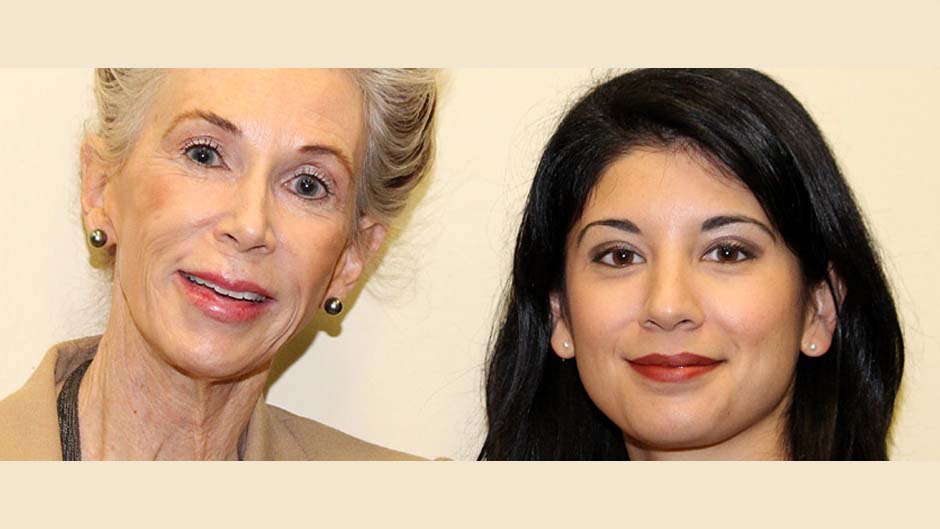In her address, Professor MacKinnon focused on the plight of sex workers, noting that the subject of prostitution comes up "whenever doing anything effective about sex trafficking is raised." Regardless of a woman's status – legal or illegal, streetwalker or call girl – they all should be treated the same in terms of human rights, she said.
"Prostitution is a form of serial rape," Professor MacKinnon said. "There can be nothing equal about it. Prostituted people are the ones who pay for paid sex."
She said that in terms of sexual exploitation, prostitution as the oldest form of oppression, "as widespread as the institutionalized sex inequality of which it is a cornerstone." Professor MacKinnon described prostitution as "choices precluded, options restricted, and possibilities denied." She noted, however, that places in which sex traffickers and pimps are targeted as criminals – rather than the prostitutes they employ – showed promise.
In her introduction, Miami Law Associate Professor Mary Anne Franks said she had had the pleasure of working with Professor MacKinnon several years ago as her research assistant at Harvard Law School. "I had just graduated from law school and had decided I wanted nothing to do with either the practice of or the teaching of law," Professor Franks said. "I found that the law was too arid, too abstract, too indifferent to the injustices and sufferings of what I found compelling. But watching Professor MacKinnon in the classroom, working with her on issues that ranged from sexual discrimination in the European Union to rape as a tool of genocide in Rwanda, changed my view of the law, and changed my view of legal academia so much that I decided to become a law professor myself."
Professor MacKinnon is Elizabeth A. Long Professor of Law at the University of Michigan and James Barr Ames Visiting Professor at Harvard Law School. She holds a B.A. from Smith College, a J.D. from Yale Law School and – also from Yale – a Ph.D. in political science, specializing in sex equality issues under international and domestic law.
Professor MacKinnon pioneered the legal claim for sexual harassment and, with Andrea Dworkin, created ordinances that recognize pornography as a civil rights violation and which adopt Sweden's model for abolishing prostitution. The Supreme Court of Canada has largely accepted her approaches to equality, pornography and hate speech, and they have also had influence elsewhere. In August 2000, representing Bosnian women survivors of Serbian genocidal sexual atrocities, she and co-counsel won a damage award of $745 million in Kadic v. Karadzic under the Alien Tort Act, the first recognition of rape as an act of genocide.
Professor MacKinnon, among the most widely cited legal scholars in the English language, has taught at Yale, Stanford, Chicago, Harvard, Columbia and Hebrew University in Jerusalem. Her scholarly books include Sexual Harassment of Working Women (1979), Feminism Unmodified (1987), Toward a Feminist Theory of the State(1989), Only Words (1993), Women's Lives, Men's Laws (2005), Are Women Human?(2006), and the casebook Sex Equality (2001/2007).
Professor MacKinnon works regularly with Equality Now, an NGO promoting international sex-equality rights for women, and the Coalition Against Trafficking in Women. While serving as the first Special Gender Adviser to the Prosecutor of the International Criminal Court in The Hague from 2008 to 2012, she implemented her concept of "gender crime."
Panelists at the University of Miami conference included Norma Ramos, Executive Director of the Coalition Against Trafficking in Women; Professor Gail Dines of Wheelock College; Barbara Martinez, U.S. Department of Justice; Susan Dechovitz, Miami-Dade State Attorney's Office; and John Arastia, of Aristia, Capote & Phang. Vivian Huelgo, Chief Legal Counsel to the American Bar Association's Task Force on Human Trafficking, moderated the discussion.
The Hispanic National Bar Association and the University of Miami School of Law hosted the event.
- Accessibility Options:
- Skip to Content
- Skip to Search
- Skip to footer
- Office of Disability Services
- Request Assistance
- 305-284-2374
- Display:
- Default
- High Contrast
- Accessibility Options:
- Skip to Content
- Skip to Search
- Skip to footer
- Office of Disability Services
- Request Assistance
- 305-284-2374
- Display:
- Default
- High Contrast
- Apply
- About UM
- Give to UM
-
Schools
- School of Architecture
- College of Arts and Sciences
- Miami Herbert Business School
- School of Communication
- School of Education and Human Development
- College of Engineering
- School of Law
- Rosenstiel School of Marine, Atmospheric, and Earth Science
- Miller School of Medicine
- Frost School of Music
- School of Nursing and Health Studies
- The Graduate School
- Division of Continuing and International Education
- Alumni
At Human Trafficking Conference, Activist on Women's Equality Focuses on Plight of Sex Workers

By UM News
University of Miami School of Law
-
1311 Miller Drive
Coral Gables, FL 33146 - lawcommunications@law.miami.edu
Resources
Quick Links
Communications
Legal
Copyright: 2026 University of Miami. All Rights Reserved.
Emergency Information
Privacy Statement & Legal Notices
Title IX & Gender Equity
Website Feedback
Individuals with disabilities who experience any technology-based barriers accessing University websites can submit details to our online form.
